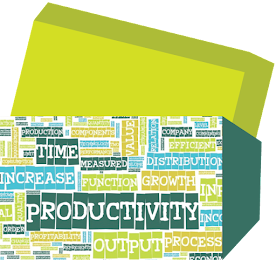Productivity Unboxed
We all have it - the need to be productive - to create something of value, preferably something that will remain. In Death of a Salesman, playwright Arthur Miller wrote that we have "a need to leave a thumb print somewhere on the world."
Creative productivity is the driving factor behind most entrepreneurships. Anyone can make money doing something, but as business owners, we want our product or service to be outstanding and make a difference beyond successful monetizing. We want to spend our time on it, enjoying the challenge and the imprints we see we are making.
What motivates our drive to be productive?
According to Psychology Today, “In humans, the drive for productivity tends to be motivated by a set of overlapping natural desires. These include a desire to contribute to a group, a desire to be challenged and mentally stimulated, and a desire to fulfill basic needs such as food, shelter, and safety.” [1]
Most of us take this drive for granted because it is core to our daily lives and how we spend almost every waking hour. Looking closer, this element, so intrinsic to life, is multi-dimensional.
Productivity:
· can be laden with frustration
o when someone is given or takes on tasks they are not prepared for.
o if someone does not delegate.
o without collaboration and/or help.
o if there are communication problems.
o if there are supply problems.
· plays a key role in our human desire for a legacy or immortality.
· can result in a blockage of creativity if overemphasized, which in turn slows or stops productivity.
· demands balance because
o too much productivity results in stress, strained relationships and mistakes.
o too little productivity can allow negative feelings such as guilt or inadequacy to creep in.
“I am what survives me”. – Erik Erikson
“The concern in establishing and guiding the next generation”[2] is how renowned psychologist Erik Erikson defined “generativity”. Generativity is the psychosocial aspect of productivity. Our desire to make a difference in our own families, jobs or companies and society – to leave the world a better place than when we arrived – is a major driving factor for our productivity.
Generativity versus Stagnation is the seventh of Erikson’s Stages of Psychosocial Development theory. In this stage, roughly between the ages of 31 and 60, optimally a person focuses on becoming a productive member of society, (generativity).
Niki Montecillo of Intuitus Group puts it this way:
“Generativity refers to being productive and creative. Whether it’s creating yourself and those around you or producing new and innovative products that ultimately help society, generativity is about continuing to improve and always working to become something new, something better and realizing one’s full potential. Generativity is a product of a well-developed ego (or self-concept) and the ability to have healthy intimate relationships with others”[3]
Outside our spheres of productivity and beyond
Miller continues the play’s dialog describing our quest to leave that thumb print as “the need for immortality, and by admitting it, the knowing that one has carefully inscribed one's name on a cake of ice on a hot July day.” What do you think he meant?
I think of it as a paradox. We're so intent on our drive to be productive we may lose sight of the big picture. What we do, the stuff we produce is very important right now for who needs it. We work so hard to get the job done and done right and done professionally, dotting i's, crossing t's meeting deadlines and garnering approvals. We have been productive. Mission accomplished. But if we're honest, we don’t know what results fall into the category of initials carved in ice on that July day.
The writer of Ecclesiastes, (one of my favorite writings), had a developed perspective, having been a successful governor most of his life:
“What do people gain from all the hard work that they work so hard at under the sun? Whatever has happened—that’s what will happen again; whatever has occurred—that’s what will occur again.”
He also said that it’s important to find pleasure in what we do for our occupation, to enjoy it. If that’s not possible, it may be time to make some changes.
If productivity is to bear enduring significance, possibly the best “thumb prints” or imprints we can leave are positive differences we make. Even minor differences matter. They may not have our name on them, but the print is still there.
“You never know when a moment and a few sincere words can have an impact on a life.” – Zig Ziglar


Comments
Post a Comment